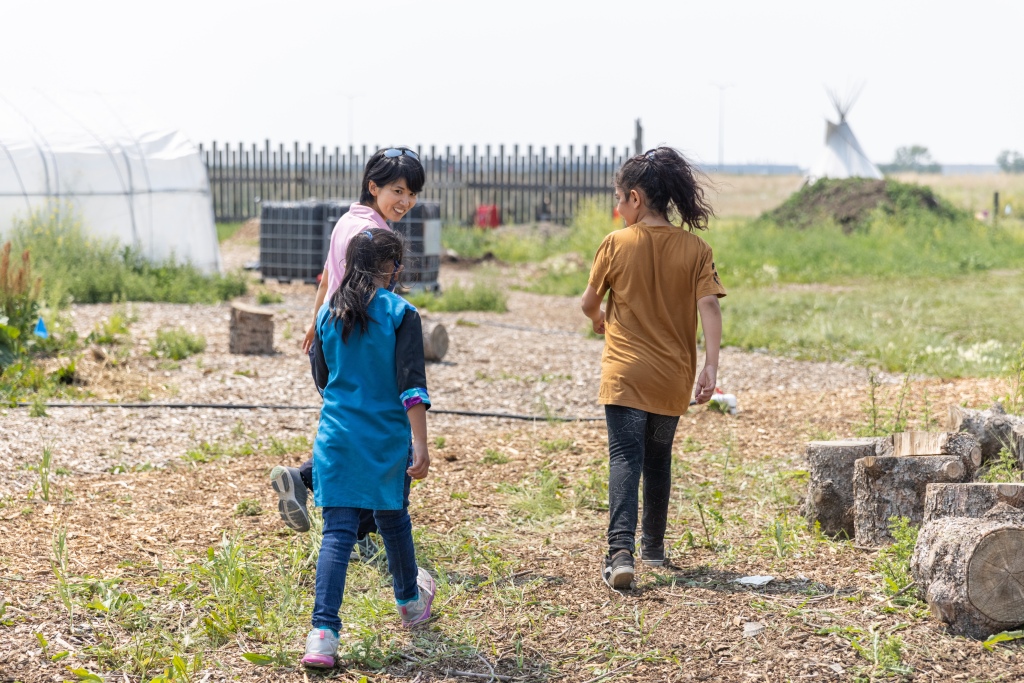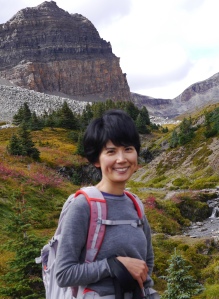
My name is Miwa (written as “身和” in kanji).
My beloved grandmother gave me this name. She grew up on a farm near a rural town facing Ise Bay, where her family cultivated a variety of plants and collected seaweed from the beach. As a teenager, she dreamed of becoming a nurse to help alleviate the suffering of people in her town. Growing up poor, without much resource to pursue her dream of becoming a nurse, she hopped onto a freight train going to Tokyo to work at a private doctor’s office. Shortly before World War II, she underwent nurse training with the Japanese Red Cross Society and served as a wartime nurse.
“Embodying peace” is what 身和 means. I was named with my grandmothers’ hopes for peace for future generations. My grandmother didn’t often share her lived experiences of war as a nurse – I can count the times she shared stories. But the few times she did share her stories were vivid, and my body remembers these stories in detail. I can still feel her treating and grieving for young wounded starving patients, as well as stepping over the bodies of the deceased after the bomb attack. While she didn’t share these stories too often, she always reminded me: “war and peace are separated by a thin line – it only takes an ordinary day for wars to begin.”
Peace is a constant effort. Although I can no longer converse with my grandmother in person, I often ask her what we do to build peace for future generations. My grandmother loved plants and flowers and she continued to grow them until the very end of her life. I believe that peace-building is not just our responsibility towards humanity, but also towards other species beyond humans.
My last names Takeuchi (竹内) and Aoki (青木) reflect the long-standing relationships between nature and humans in the context of Japan. Takeuchi means “living within the bamboo grove” and Aoki means “being close to lively green trees.”
How to pronounce my name: click!
I am currently an Associate Professor in the Learning Sciences at the Werklund School of Education, University of Calgary.
I currently serve on the Board of Directors at the International Society of the Learning Sciences and as President for the Network of the Learning Sciences in Canada. I firmly believe in the transformative power of collective action rooted in love – specifically, “decolonial love” as Leanne Betasamosake Simpson’s collection of short stories illustrate in Islands of Decolonial Love and as discussed by my colleague, Dr. Ananda Marin and myself in this article. Through our ongoing efforts to create a dynamic, equitable, and inclusive field, one that extends beyond disciplinary silos and academic institutions, I am hopeful that we can enrich our knowledge production and promote decolonial love.
Before coming to Calgary, I completed my PhD in the Department of Curriculum, Teaching and Learning at the Ontario Institute for Studies in Education of the University of Toronto.
Previously, I worked as a research fellow with the Japan Society for the Promotion of Science.
Visions
My works are connected toward the goal of re-imagining mathematics and STEM learning, with a focus on linguistic diversity, historicity, and power. Toward fostering transdisciplinary experiences, I keenly observe and listen to learners’ embodied and emplaced experiences that have been historically subjugated or hidden. I also pay attention to the collective mobilization of mathematics and STEM literacy by people working towards social and environmental justice.
To me, research is a means of shedding light on the traditionally unseen and hidden disciplinary knowledge shared by (im)migrant and refugee learners and their families. I value co-designing learning environments with learners (including) teachers, community activists, and families. I am committed to amplifying longitudinal and historical analyses of learning.
Please read more about my ongoing projects with my collaborators here!

I love being in Calgary for its accessibility for outdoor activities – I love biking, hiking, and cross-country skiing.
At home, I play the piano and sing (not too well… but I still enjoy). I cultivate my little garden and observe how plants grow in the ecosystem.
I draw a comic based on my mundane and humorous life with my beloved partner (my comic is entitled “Everyday Queer” – TBC in my Blog).
Outside of these times, I spend my days doing what I love: engaging with communities, walking alongside people, having conversations about ideas that can create positive change, collaborating with others to build something meaningful, and reading/writing/teaching.

Land Acknowledgement
In the spirit of respect, reciprocity and truth, I honor and acknowledge the land beneath our feet, stewarded by many generations of Indigenous peoples.
My professional life at the University of Calgary is only made possible by the abundance of knowledge and teachings provided by the land and water of this place, now known as “Calgary.” Before coloniazation, this land was called Moh-kíns-tsis (Calgary), Wincheesh-pah (Nakoda), Otos-kwunee (Cree), Kootsisáw (Tsuu’tina) and Klincho-tinay-indihay (Slavey). Long before it was colonized, this land beneath our feet were stewarded by the Blackfoot people, the people of the Siksika, the North and South Piikanai, the Kanai, Îyâxe Nakoda and Tsuut’ina nations. I acknowledge that this territory is home to the Métis Nation of Alberta, Region 3 within the historical Northwest Métis homeland. I am aware of our privilege to live, grow, play, and learn on this land.
Through our collective work toward food justice, we grow many varieties of vegetation and plants that have sustained our culturally relevant diets while honouring and respecting plants of Indigenous people that sustained and nourished the people of this land for generations; Aóhtoksóoki (yarrow), Puck-keep (chockecherry), Aphahsipoko (dogwood), Sipatsimo (sweet grass) to name a few among many others.
As an educator and educational researcher, I acknowledge the past wrongdoings done through schooling on Indigenous communities and commit to reflect on Canada’s colonial histories and learn to act toward reconciliation with and the resurgence of Indigenous communities.
While symbolic gestures are important in affirming our commitment to facing the history of settler colonialism, we must move beyond mere symbolism and take concrete actions.
A list of collective actions I greatly appreciate and support: https://landback.org, https://legacyofhope.ca, https://www.themossbagproject.org.
I appreciate and learn from works written by Indigenous authors (some of my readings are listed on our Soil Camp website).
